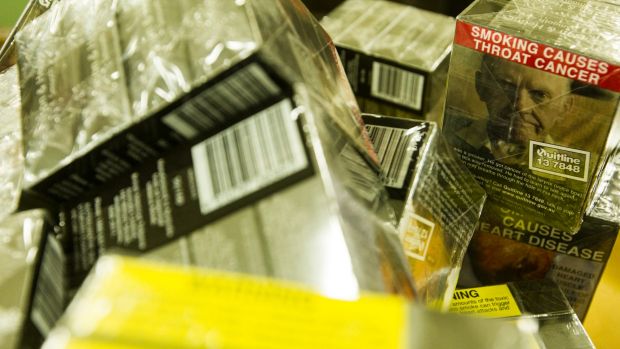
Boxed in: Philip Morris and British American Tobacco have released a report attacking plain packaging. Photo: Nic Walker
The two biggest tobacco companies in Australia have begun a campaign to undermine the nation’s plain packaging laws, ahead of a Department of Health review of the effectiveness of the regulations.
Philip Morris and British American Tobacco have briefed research and data to media outlets as “proof” plain packaging laws have failed, on the eve of their second anniversary on December 1.
Philip Morris is promoting “a new piece of independent research that finds there is no evidence that plain packaging for cigarettes is working”.
That research, emailed to media by Philip Morris, is titled “The Plain Truth about Plain Packaging: An Econometric Analysis of the Australian 2011 Tobacco Plain Packaging Act”.
One of the research authors, Professor Sinclair Davidson, is a senior fellow at the Institute of Public Affairs, a right-wing think tank that has received considerable funding from Big Tobacco over the past 10 years.
According to Philip Morris spokesman Simon Dowding, “the study was produced by respected Australian academic Professor Sinclair Davidson from RMIT, and has just been published in the Australian National University journal, Agenda“.
But it makes no mention of Mr Sinclair’s association with the IPA, or the long history of tobacco funding of the organisation.
Philip Morris claims Mr Sinclair’s “independent research” proves that “sales of tobacco are surging despite plain packaging”.
The IPA’s deputy executive director James Paterson said that while 25 per cent of their funding came from business donors, they had a “longstanding policy of protecting their [donors’] privacy”.
At the same time British American Tobacco is pushing data re-released by the Australian Institute of Health and Welfare showing the rate of smoking has gone up among 12-17 year olds.
Spokesman Scott McIntyre said the data showed the national smoking rate had increased in that age group by 32 per cent, rising from 2.5 per cent in 2010 to 3.4 per cent in 2013, meaning the laws’ primary objective of deterring children had failed.
But the statistics body’s head of tobacco and other drugs unit, Amber Jefferson, said the report clearly stated that the sample size was too small to be able to draw a conclusion of a spike in uptake.
“The results remain stable. There might appear to be a percentage point increase, but it’s not statistically significant,” she said.
Earlier in the week libertarian senator David Leyonhjelm – who receives funding from big tobacco – also held a press conference calling for a crackdown on illegal tobacco sales, which tobacco companies claim have risen since the introduction of plain packaging.
A co-ordinated assault just ahead of the review of plain packaging laws is emerging, with the Australian Retailers Association on Wednesday also labelling the laws a “waste of retailer’s time and resources”.
Executive director Russell Zimmerman cited a KPMG report which showed that illegal tobacco accounted for 14.3 per cent of all tobacco use, up from 13.5 per cent on the previous year.
Mr Zimmerman said the ARA was concerned illegal tobacco products were “swamping the market” and costing the government $1.2 billion in tobacco excise.
The tobacco giants may be getting nervous, as raw sales data obtained from Australia’s supermarkets indicates smoking rates have fallen over the past year, even though revenues are up due to higher taxes.
IRI-Aztec data, which tracks actual sales at Coles, Woolworths, IGA and Foodworks, reveals the number of cigarettes sold at supermarkets fell 2.9 per cent last financial year, suggesting that plain packaging and higher taxes are working to reduce smoking rates.
The supermarkets covered by the IRI-Aztec report account for more than 65 per cent of Australia’s $13.5 billion cigarette and tobacco market.
